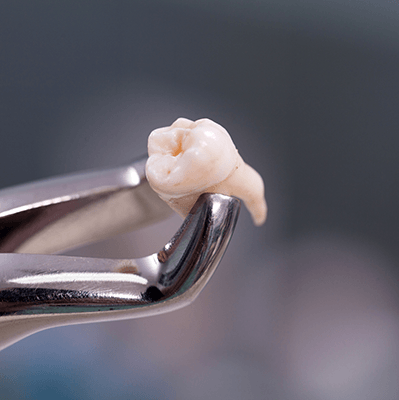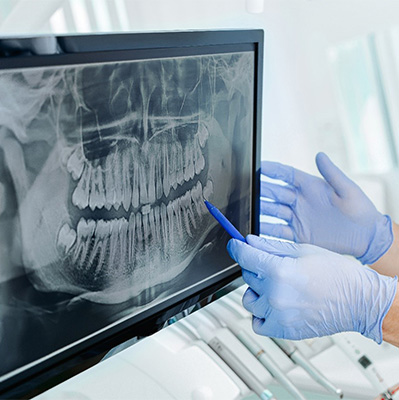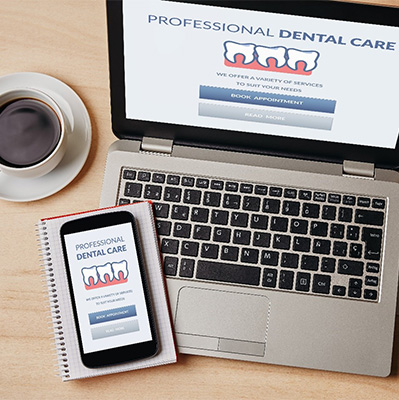Tooth Extractions – Worcester, MA
Strategically Removing Teeth to Safeguard Your Smile
Here at Winthrop Street Dentistry, we understand that your teeth are an important part of you—which is why tooth extraction is something we take quite seriously! We’re proud to offer in-house extractions to help you safeguard your smile and ensure that no matter what the future holds, a damaged, decayed, or otherwise compromised tooth won’t be something that keeps you up at night. Keep reading below to learn a little more about tooth extractions and when they become necessary, along with what you can expect both during and after the procedure. Of course, if you have any other questions or concerns, feel free to reach out for assistance!
Why Choose Winthrop Street Dentistry for Tooth Extractions?
- Same-Day Appointments Available
- Beautiful, Durable Tooth Replacement Options
- Wisdom Tooth Extractions Available
Reasons Why Tooth Extractions Are Necessary

Your natural teeth are the most important tools at your disposal for daily activities such as eating, speaking, laughing and so on, meaning that if we’ve recommended a tooth extraction, we aren’t doing so lightly—there’s a very good reason for it! If there’s even the slightest chance we can save your tooth, we’ll pursue that avenue first. However, in some cases, the procedure is deemed necessary in order to protect your oral health. Here are a few situations that can warrant tooth extraction:
- Extensive decay or irreparable damage in the tooth
- Severe dental infection that poses a threat to other existing teeth
- Advanced gum disease that’s caused jawbone deterioration
- A baby tooth that hasn’t fallen out on its own
- Wisdom teeth that have become partially or fully impacted
The Process of Removing a Tooth

There are two main approaches that we can use to remove your tooth: simple extraction and surgical extraction. When the tooth in question has fully emerged from the gums, a simple extraction is the go-to method; a small pair of forceps is used to gently rock the tooth back and forth until it separates from your gum tissue.
A surgical extraction is used when a tooth is still mostly or fully beneath the gumline. It involves making a small incision in the gum tissue to access more of the tooth, before it’s then removed in separate pieces to minimize bone loss. Both methods are effective and safe for patients, and we’ll let you know which is ideal for your situation when you visit us for a consultation.
Tooth Extraction Aftercare

Once your tooth has been removed, you aren’t out of the woods just yet! Our team will provide you with a detailed list of post-op instructions for you to follow to ensure a smooth and speedy recovery. In any case, here is some general aftercare advice to keep in mind:
- Take your prescribed and over-the-counter pain relievers as instructed.
- Get plenty of rest and avoid exercising, as the increased blood flow can impact your mouth’s healing process.
- Stay away from hard, crunchy, sticky, or spicy foods for at least several days.
- Also refrain from smoking or using tobacco products.
- Drink plenty of water to stay hydrated, but do not use a drinking straw at all, since the suction can impede your mouth’s recuperation.
- Brush carefully around your surgical site; after 24 hours have passed, you can rinse your mouth using a mixture of warm water and a half tsp. of salt.
It’s normal for patients to experience some light bleeding, swelling, and generalized discomfort following tooth extraction; however, these symptoms are fleeting and should clear up after a few days. If things continue to bother you or worsen, don’t hesitate to contact us as it might indicate a complication with healing.
Understanding the Cost of Tooth Extractions

Whether you need a tooth removed because of overcrowding or because of severe decay, you might have one question on your mind, “How much does it cost?” Don’t worry – we will provide you with a detailed estimate at your consultation and review all of the financial solutions we offer to keep your out-of-pocket expenses as affordable as possible. If you’re interested in learning more before then, keep reading!
Factors That Can Affect Tooth Extraction Cost

In order to determine the price of your care, we need to first consider:
- How many teeth need to be extracted – Naturally, having multiple teeth removed comes with a higher price tag compared to simply having one pulled.
- The type and location of the tooth – Since the anatomy of your molars is more complex, it typically costs more to have them removed.
- The kind of extraction necessary – There are two types of extractions: simple and surgical. The type needed to remove your tooth will impact the price as well.
- How you want to fill the new gap in your smile – Dental bridges, dentures, and dental implants can all fill the open spaces in your smile, and each comes with their own price tag.
Does Dental Insurance Cover Tooth Extractions?

Since tooth extractions are considered a major dental procedure, dental insurance providers typically do cover a portion of the cost. Of course, the fine print on each policy is a bit different, which is why understanding your benefits isn’t always as straightforward as you might expect. The good news is that our Worcester dental team welcomes Aetna, Altus, BlueCross BlueShield, Delta Dental, and several other popular providers! That means that we can help you understand your coverage, maximize your benefits, and even file the paperwork on your behalf.
How to Make Tooth Extractions Affordable

If you don’t have dental insurance, you might be wondering if there is another way to make the cost more affordable. There is! We’re happy to welcome MassHealth for patients under the age of 21, and we welcome flexible financing with CareCredit. The latter is a trusted third-party financier that offers payment plans over the course of several months. As a result, you don’t have to pay for your tooth extraction in one lump sum – you can space it out into budget-friendly chunks! If you want to learn more about the financial solutions available to you outside of dental insurance, then don’t hesitate to get in touch with us so we can help.
Tooth Extractions FAQs
Does Getting a Tooth Extracted Hurt?
Let’s start with one of the most asked questions about tooth extractions: does it hurt? You’ll be happy to know that your time in the treatment chair won’t be painful at all thanks to powerful numbing agents. Our Worcester dental team is also highly trained and utilizes the latest dental technology, which ensures that your experience at our office will be positive.
Important note: Some soreness during the recovery period is to be expected. That said, we will provide you with detailed aftercare instructions so you know exactly what to do to heal as comfortably as possible.
What’s the Difference Between Tooth Extractions and Wisdom Tooth Surgery?
One of the biggest differences between tooth extractions and wisdom tooth surgery is that the latter is designed to remove the third set of molars specifically. There are other differences, however. For example, wisdom tooth extractions are often a surgical procedure that involves removing a tooth below the gumline, before it results in serious dental problems. Tooth extractions, on the other hand, often remove a tooth that’s already emerged but needs to be removed because it’s severely damaged.
How Should I Prepare for My Tooth Extraction?
You might know what to do after your procedure, but is there anything you need to do beforehand? First, we recommend arranging for a trusted adult to drive you home from our office. Second, organize your nightstand with all of the essentials (i.e., pain medication, water bottles, gauze) so you don’t have to worry about anything but healing when you get home. Third, stick to water the morning of your appointment if dental sedation is part of your treatment plan.
Can I Leave the Space Empty After a Tooth Extraction?
There are some cases where you can leave the space empty, like if the tooth was moved prior to orthodontic treatment. In most cases, however, a dental bridge, denture, or implant needs to be put in its place. If that doesn’t happen in a timely manner, then the look, health, and function of your smile can seriously suffer. In short, even if you can’t see the gap in your smile, it’s usually best to have it filled with the appropriate tooth-replacement solution.
What Are My Options for Replacing a Missing Tooth?
That depends on a few factors, including if there are other gaps throughout your mouth. If there are, then a partial denture may be ideal since this restoration works like a puzzle piece to fill in multiple spaces. If, on the other hand, you’re only missing one tooth, then a dental bridge or implant is more ideal. Rest assured, our highly experienced team at Winthrop Street Dentistry will share the pros of each as well as their recommendations to help make the decision of how to move forward easy.



